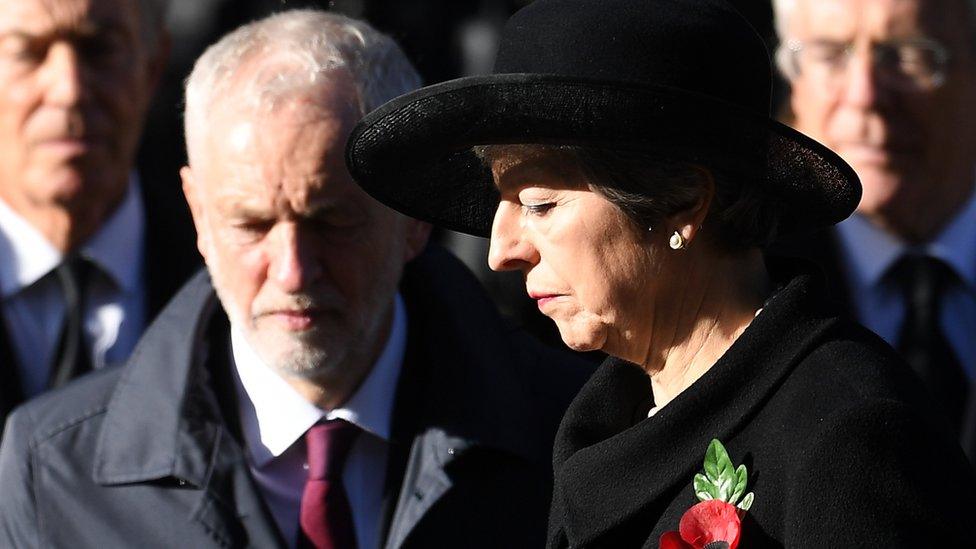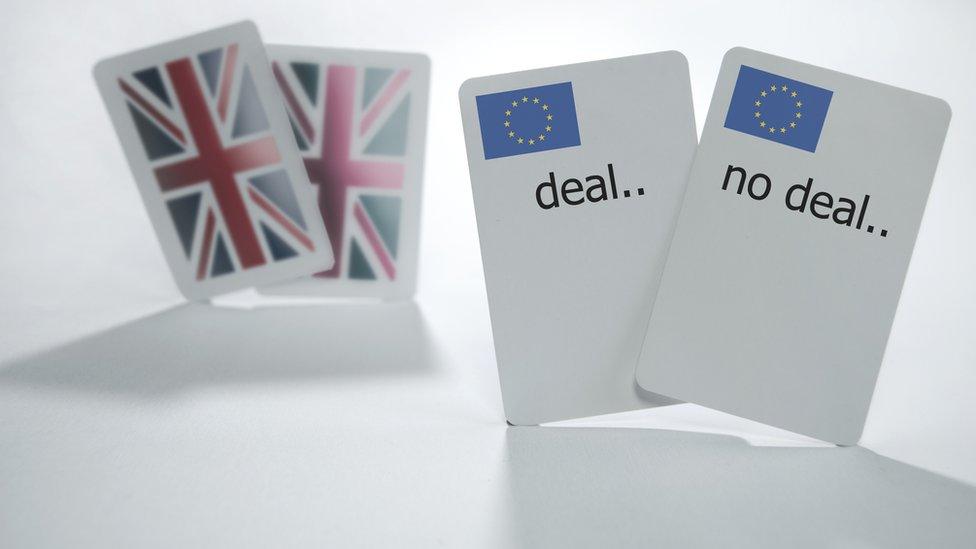Brexit: May and Corbyn need each other as endgame nears
- Published

Theresa May and Jeremy Corbyn are an unlikely pair with vastly different political outlooks.
But the prime minister and Labour leader may find they are tied to each other in the coming month in ways that may well surprise both them and their parties.
In the Brexit endgame, each has one overriding aim and they may need the other to secure their goals.
The prime minister desperately needs Parliament to pass her Brexit deal - and that will probably be achieved only with Labour votes or abstentions. The Labour leader wants a general election which will only happen with Tory acquiescence.
Their joint need for each to reach their respective goals means that the pair may have to make compromises which, at the moment, appear unthinkable. But it may be the price they have to pay for survival - in the prime minister's case - and for a route to No 10 in the case of the Labour leader.
For the moment, we will hear the prime minister saying she will not cut any deals with other parties in the run up to the "meaningful vote" in Parliament. She will say the parties should do as she has done in the Brexit negotiations and simply act in the national interest to vote for her deal to avoid no deal or no Brexit.
For his part, Jeremy Corbyn will say that Labour will vote down the prime minister's deal on the grounds that it fails the party's six Brexit tests.
Labour believes it is on strong ground here because sources say Michel Barnier has indicated to the party that the EU would be prepared to renegotiate the Brexit deal if another UK government found itself in office following a rejection of the current deal in Parliament.
Downing St hopes those Labour dreams will be quashed on Sunday if EU leaders endorse the Brexit deal at a summit in Brussels. No 10 is hoping that the likes of Emmanuel Macron, Angela Merkel and Jean-Claude Juncker will say the withdrawal agreement has been finalised and cannot be reopened.
No 10 is also hoping that at this point Labour would have to compromise and, at the very least, not block the deal in Parliament. Expect the prime minister to say that a vote against the deal would be thwarting the will of the people.
General election?
At this point, however, Jeremy Corbyn would have a strong hand to play because the prime minister will probably not be able to pass her deal solely on the basis of Tory and DUP votes.
With her fate in his hands, the Labour leader may well feel he could exact a price for allowing the prime minister's EU withdrawal agreement to pass through Parliament.
The Labour price could be: the party will allow the EU divorce settlement to pass in exchange for the prime minister agreeing to a general election to allow the British people to elect a government to negotiate the next stage of Brexit.
That is the future partnership that will decide the UK's relationship with the EU in the decades to come.
And so in the coming month Theresa May could find herself having to agree to the one thing she has been desperate to avoid (a general election) as the price for the thing she desperately needs (a withdrawal agreement with the EU).
If the prime minister agreed to such a Labour request she would then have to whip her MPs to vote in favour of an early general election.
At that point Sir Graham Brady may find confidence letters from Tory MPs piling up in his letter box - if such a vote has not already been held by then.
And so the Brexit saga goes round in circles.
You can watch Newsnight on BBC 2 weekdays 22:30 or on iPlayer. Subscribe to the programme on YouTube, external or follow them on Twitter, external.
- Published12 November 2018
- Published19 November 2018
